The Impact of Parenting Styles on Child Mental Wellbeing: A Study
VerifiedAdded on 2023/01/05
|6
|999
|24
Essay
AI Summary
This essay delves into the significant role of parenting styles in shaping a child's mental and physical wellbeing, influencing their personality and future endeavors. It explores the theories of Diana Baumrind and the expansion by Maccoby and Martin, categorizing parenting styles into authoritative, authoritarian, permissive, and neglectful approaches. The essay highlights the characteristics and consequences of each style, emphasizing the positive outcomes associated with authoritative parenting, such as higher self-esteem and better mental health. It also discusses the importance of considering factors like family culture and child temperament when choosing a parenting style, and references resources like the Health and Human Services Child Welfare Information Gateway for effective parenting strategies. This essay, contributed by a student, provides a comprehensive overview of how different parenting styles impact child development, offering valuable insights into the complexities of parent-child relationships.
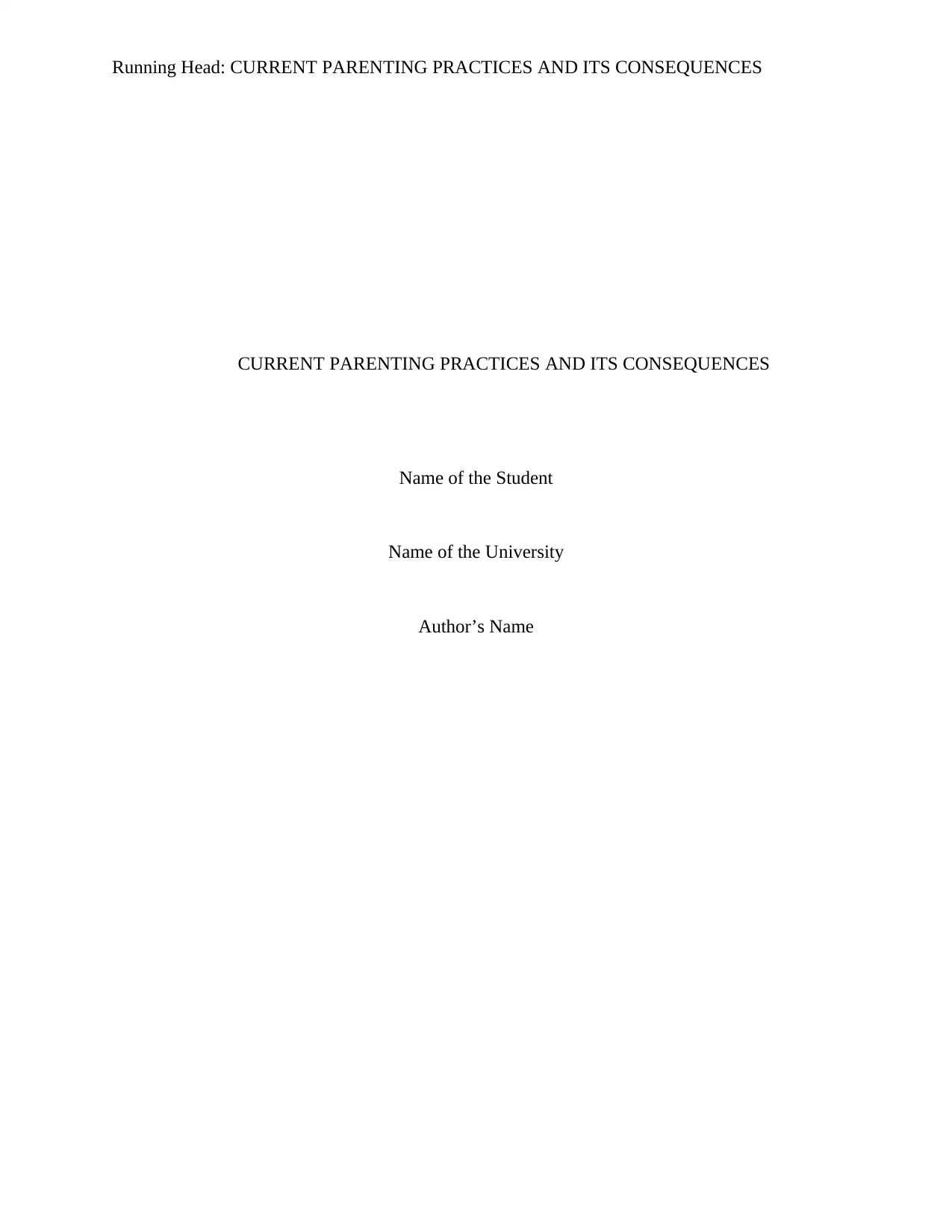
Running Head: CURRENT PARENTING PRACTICES AND ITS CONSEQUENCES
CURRENT PARENTING PRACTICES AND ITS CONSEQUENCES
Name of the Student
Name of the University
Author’s Name
CURRENT PARENTING PRACTICES AND ITS CONSEQUENCES
Name of the Student
Name of the University
Author’s Name
Paraphrase This Document
Need a fresh take? Get an instant paraphrase of this document with our AI Paraphraser
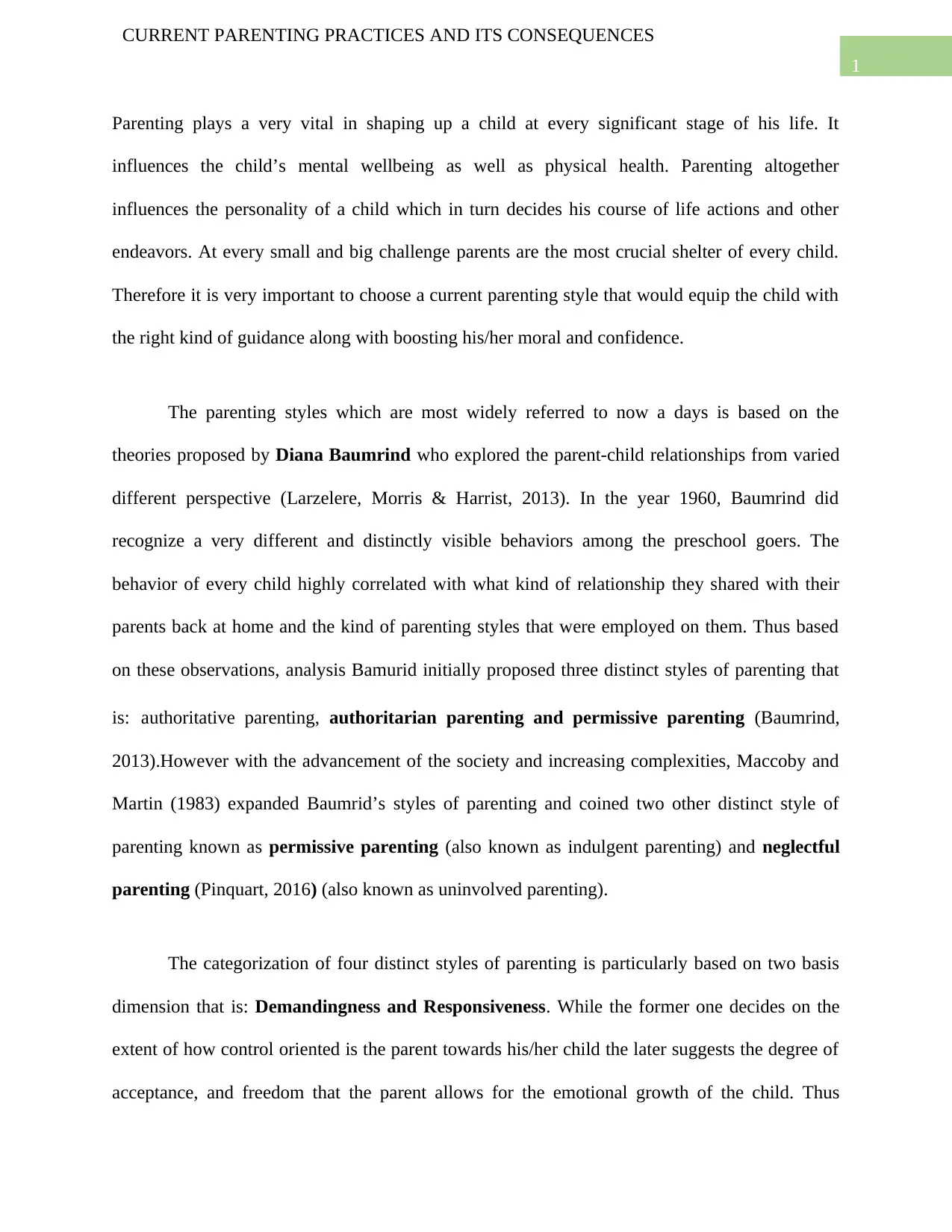
1
CURRENT PARENTING PRACTICES AND ITS CONSEQUENCES
Parenting plays a very vital in shaping up a child at every significant stage of his life. It
influences the child’s mental wellbeing as well as physical health. Parenting altogether
influences the personality of a child which in turn decides his course of life actions and other
endeavors. At every small and big challenge parents are the most crucial shelter of every child.
Therefore it is very important to choose a current parenting style that would equip the child with
the right kind of guidance along with boosting his/her moral and confidence.
The parenting styles which are most widely referred to now a days is based on the
theories proposed by Diana Baumrind who explored the parent-child relationships from varied
different perspective (Larzelere, Morris & Harrist, 2013). In the year 1960, Baumrind did
recognize a very different and distinctly visible behaviors among the preschool goers. The
behavior of every child highly correlated with what kind of relationship they shared with their
parents back at home and the kind of parenting styles that were employed on them. Thus based
on these observations, analysis Bamurid initially proposed three distinct styles of parenting that
is: authoritative parenting, authoritarian parenting and permissive parenting (Baumrind,
2013).However with the advancement of the society and increasing complexities, Maccoby and
Martin (1983) expanded Baumrid’s styles of parenting and coined two other distinct style of
parenting known as permissive parenting (also known as indulgent parenting) and neglectful
parenting (Pinquart, 2016) (also known as uninvolved parenting).
The categorization of four distinct styles of parenting is particularly based on two basis
dimension that is: Demandingness and Responsiveness. While the former one decides on the
extent of how control oriented is the parent towards his/her child the later suggests the degree of
acceptance, and freedom that the parent allows for the emotional growth of the child. Thus
CURRENT PARENTING PRACTICES AND ITS CONSEQUENCES
Parenting plays a very vital in shaping up a child at every significant stage of his life. It
influences the child’s mental wellbeing as well as physical health. Parenting altogether
influences the personality of a child which in turn decides his course of life actions and other
endeavors. At every small and big challenge parents are the most crucial shelter of every child.
Therefore it is very important to choose a current parenting style that would equip the child with
the right kind of guidance along with boosting his/her moral and confidence.
The parenting styles which are most widely referred to now a days is based on the
theories proposed by Diana Baumrind who explored the parent-child relationships from varied
different perspective (Larzelere, Morris & Harrist, 2013). In the year 1960, Baumrind did
recognize a very different and distinctly visible behaviors among the preschool goers. The
behavior of every child highly correlated with what kind of relationship they shared with their
parents back at home and the kind of parenting styles that were employed on them. Thus based
on these observations, analysis Bamurid initially proposed three distinct styles of parenting that
is: authoritative parenting, authoritarian parenting and permissive parenting (Baumrind,
2013).However with the advancement of the society and increasing complexities, Maccoby and
Martin (1983) expanded Baumrid’s styles of parenting and coined two other distinct style of
parenting known as permissive parenting (also known as indulgent parenting) and neglectful
parenting (Pinquart, 2016) (also known as uninvolved parenting).
The categorization of four distinct styles of parenting is particularly based on two basis
dimension that is: Demandingness and Responsiveness. While the former one decides on the
extent of how control oriented is the parent towards his/her child the later suggests the degree of
acceptance, and freedom that the parent allows for the emotional growth of the child. Thus
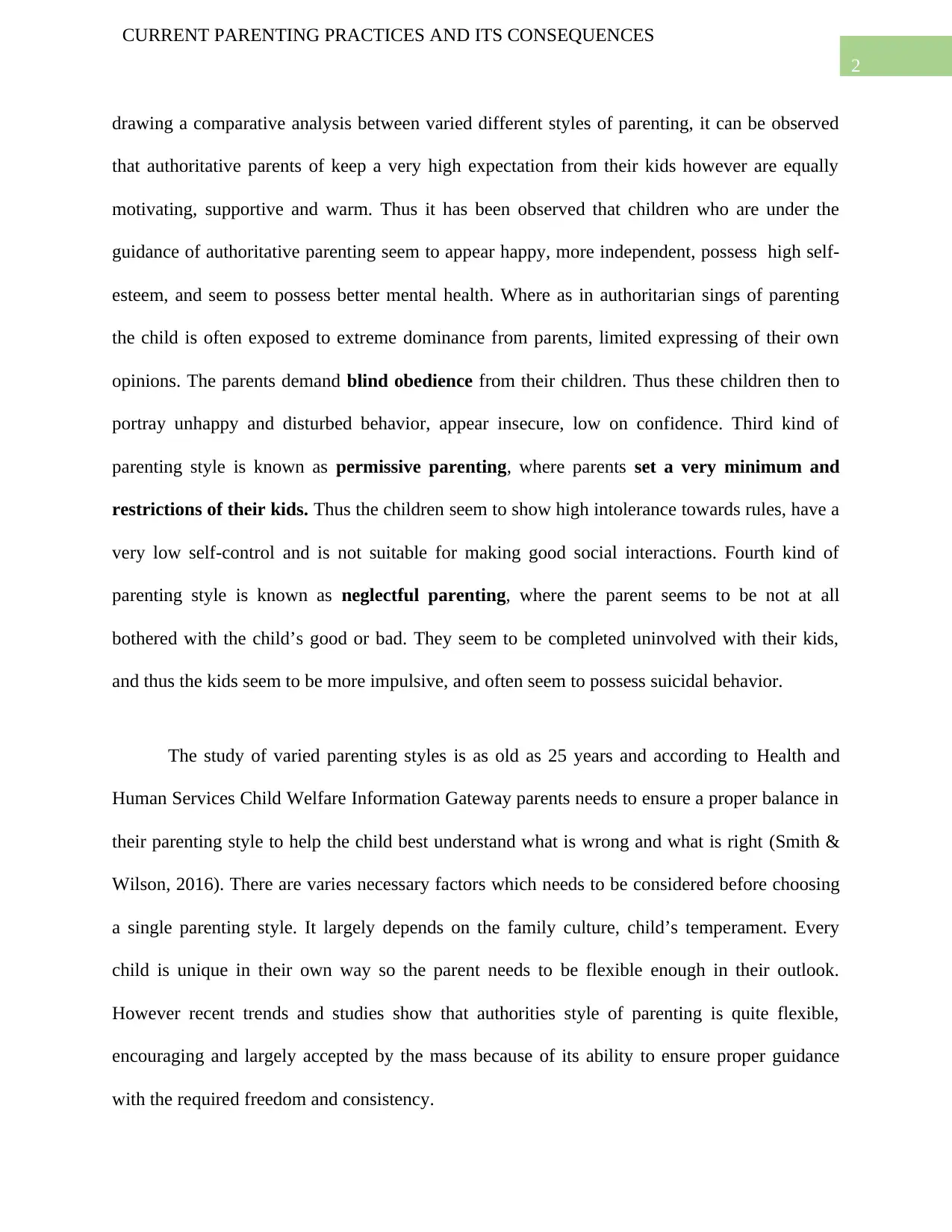
2
CURRENT PARENTING PRACTICES AND ITS CONSEQUENCES
drawing a comparative analysis between varied different styles of parenting, it can be observed
that authoritative parents of keep a very high expectation from their kids however are equally
motivating, supportive and warm. Thus it has been observed that children who are under the
guidance of authoritative parenting seem to appear happy, more independent, possess high self-
esteem, and seem to possess better mental health. Where as in authoritarian sings of parenting
the child is often exposed to extreme dominance from parents, limited expressing of their own
opinions. The parents demand blind obedience from their children. Thus these children then to
portray unhappy and disturbed behavior, appear insecure, low on confidence. Third kind of
parenting style is known as permissive parenting, where parents set a very minimum and
restrictions of their kids. Thus the children seem to show high intolerance towards rules, have a
very low self-control and is not suitable for making good social interactions. Fourth kind of
parenting style is known as neglectful parenting, where the parent seems to be not at all
bothered with the child’s good or bad. They seem to be completed uninvolved with their kids,
and thus the kids seem to be more impulsive, and often seem to possess suicidal behavior.
The study of varied parenting styles is as old as 25 years and according to Health and
Human Services Child Welfare Information Gateway parents needs to ensure a proper balance in
their parenting style to help the child best understand what is wrong and what is right (Smith &
Wilson, 2016). There are varies necessary factors which needs to be considered before choosing
a single parenting style. It largely depends on the family culture, child’s temperament. Every
child is unique in their own way so the parent needs to be flexible enough in their outlook.
However recent trends and studies show that authorities style of parenting is quite flexible,
encouraging and largely accepted by the mass because of its ability to ensure proper guidance
with the required freedom and consistency.
CURRENT PARENTING PRACTICES AND ITS CONSEQUENCES
drawing a comparative analysis between varied different styles of parenting, it can be observed
that authoritative parents of keep a very high expectation from their kids however are equally
motivating, supportive and warm. Thus it has been observed that children who are under the
guidance of authoritative parenting seem to appear happy, more independent, possess high self-
esteem, and seem to possess better mental health. Where as in authoritarian sings of parenting
the child is often exposed to extreme dominance from parents, limited expressing of their own
opinions. The parents demand blind obedience from their children. Thus these children then to
portray unhappy and disturbed behavior, appear insecure, low on confidence. Third kind of
parenting style is known as permissive parenting, where parents set a very minimum and
restrictions of their kids. Thus the children seem to show high intolerance towards rules, have a
very low self-control and is not suitable for making good social interactions. Fourth kind of
parenting style is known as neglectful parenting, where the parent seems to be not at all
bothered with the child’s good or bad. They seem to be completed uninvolved with their kids,
and thus the kids seem to be more impulsive, and often seem to possess suicidal behavior.
The study of varied parenting styles is as old as 25 years and according to Health and
Human Services Child Welfare Information Gateway parents needs to ensure a proper balance in
their parenting style to help the child best understand what is wrong and what is right (Smith &
Wilson, 2016). There are varies necessary factors which needs to be considered before choosing
a single parenting style. It largely depends on the family culture, child’s temperament. Every
child is unique in their own way so the parent needs to be flexible enough in their outlook.
However recent trends and studies show that authorities style of parenting is quite flexible,
encouraging and largely accepted by the mass because of its ability to ensure proper guidance
with the required freedom and consistency.
⊘ This is a preview!⊘
Do you want full access?
Subscribe today to unlock all pages.

Trusted by 1+ million students worldwide
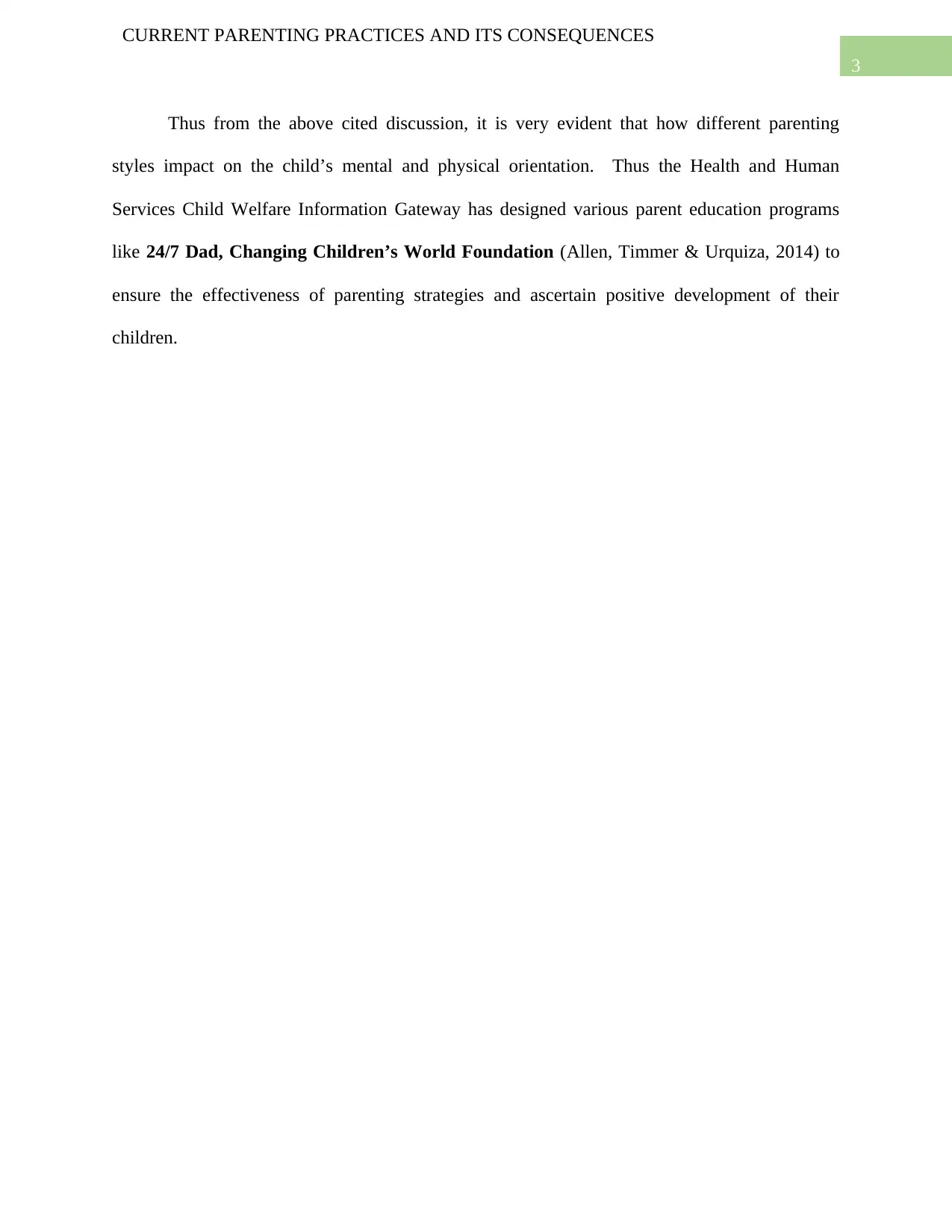
3
CURRENT PARENTING PRACTICES AND ITS CONSEQUENCES
Thus from the above cited discussion, it is very evident that how different parenting
styles impact on the child’s mental and physical orientation. Thus the Health and Human
Services Child Welfare Information Gateway has designed various parent education programs
like 24/7 Dad, Changing Children’s World Foundation (Allen, Timmer & Urquiza, 2014) to
ensure the effectiveness of parenting strategies and ascertain positive development of their
children.
CURRENT PARENTING PRACTICES AND ITS CONSEQUENCES
Thus from the above cited discussion, it is very evident that how different parenting
styles impact on the child’s mental and physical orientation. Thus the Health and Human
Services Child Welfare Information Gateway has designed various parent education programs
like 24/7 Dad, Changing Children’s World Foundation (Allen, Timmer & Urquiza, 2014) to
ensure the effectiveness of parenting strategies and ascertain positive development of their
children.
Paraphrase This Document
Need a fresh take? Get an instant paraphrase of this document with our AI Paraphraser
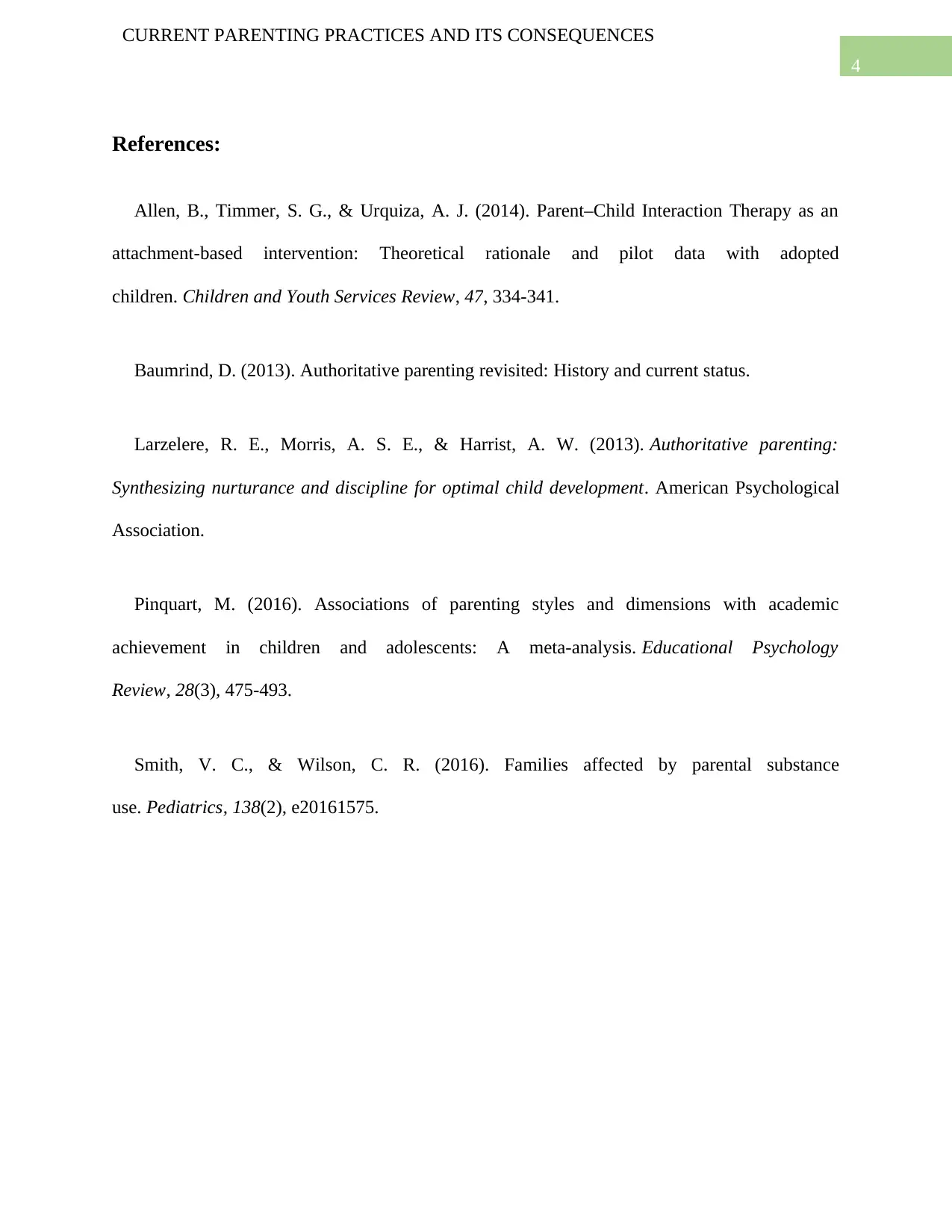
4
CURRENT PARENTING PRACTICES AND ITS CONSEQUENCES
References:
Allen, B., Timmer, S. G., & Urquiza, A. J. (2014). Parent–Child Interaction Therapy as an
attachment-based intervention: Theoretical rationale and pilot data with adopted
children. Children and Youth Services Review, 47, 334-341.
Baumrind, D. (2013). Authoritative parenting revisited: History and current status.
Larzelere, R. E., Morris, A. S. E., & Harrist, A. W. (2013). Authoritative parenting:
Synthesizing nurturance and discipline for optimal child development. American Psychological
Association.
Pinquart, M. (2016). Associations of parenting styles and dimensions with academic
achievement in children and adolescents: A meta-analysis. Educational Psychology
Review, 28(3), 475-493.
Smith, V. C., & Wilson, C. R. (2016). Families affected by parental substance
use. Pediatrics, 138(2), e20161575.
CURRENT PARENTING PRACTICES AND ITS CONSEQUENCES
References:
Allen, B., Timmer, S. G., & Urquiza, A. J. (2014). Parent–Child Interaction Therapy as an
attachment-based intervention: Theoretical rationale and pilot data with adopted
children. Children and Youth Services Review, 47, 334-341.
Baumrind, D. (2013). Authoritative parenting revisited: History and current status.
Larzelere, R. E., Morris, A. S. E., & Harrist, A. W. (2013). Authoritative parenting:
Synthesizing nurturance and discipline for optimal child development. American Psychological
Association.
Pinquart, M. (2016). Associations of parenting styles and dimensions with academic
achievement in children and adolescents: A meta-analysis. Educational Psychology
Review, 28(3), 475-493.
Smith, V. C., & Wilson, C. R. (2016). Families affected by parental substance
use. Pediatrics, 138(2), e20161575.
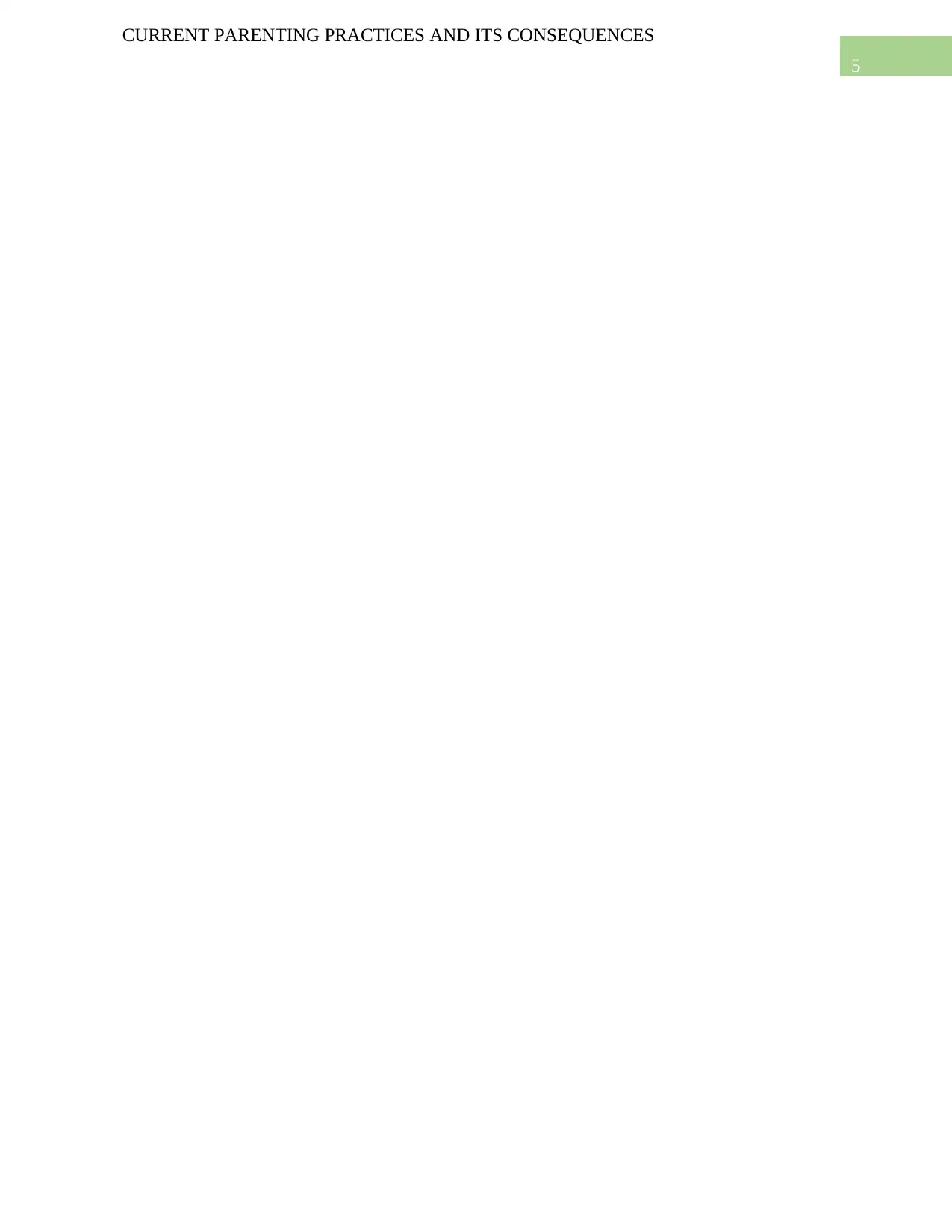
5
CURRENT PARENTING PRACTICES AND ITS CONSEQUENCES
CURRENT PARENTING PRACTICES AND ITS CONSEQUENCES
⊘ This is a preview!⊘
Do you want full access?
Subscribe today to unlock all pages.

Trusted by 1+ million students worldwide
1 out of 6
Related Documents
Your All-in-One AI-Powered Toolkit for Academic Success.
+13062052269
info@desklib.com
Available 24*7 on WhatsApp / Email
![[object Object]](/_next/static/media/star-bottom.7253800d.svg)
Unlock your academic potential
Copyright © 2020–2026 A2Z Services. All Rights Reserved. Developed and managed by ZUCOL.





